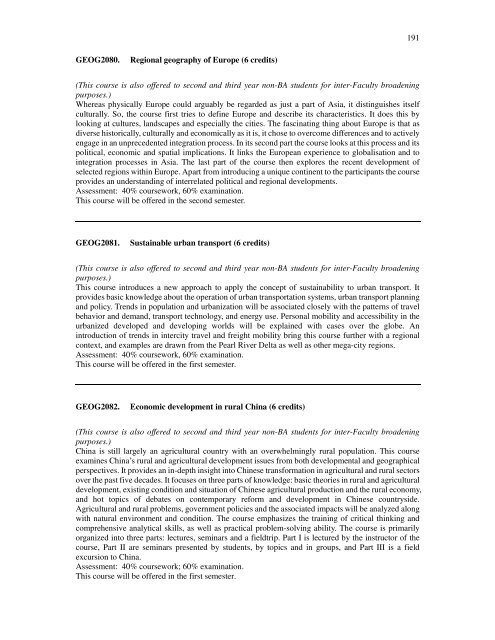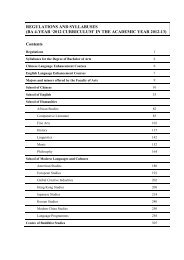Bachelor of Arts (BA) - The University of Hong Kong
Bachelor of Arts (BA) - The University of Hong Kong
Bachelor of Arts (BA) - The University of Hong Kong
Create successful ePaper yourself
Turn your PDF publications into a flip-book with our unique Google optimized e-Paper software.
191GEOG2080.Regional geography <strong>of</strong> Europe (6 credits)(This course is also <strong>of</strong>fered to second and third year non-<strong>BA</strong> students for inter-Faculty broadeningpurposes.)Whereas physically Europe could arguably be regarded as just a part <strong>of</strong> Asia, it distinguishes itselfculturally. So, the course first tries to define Europe and describe its characteristics. It does this bylooking at cultures, landscapes and especially the cities. <strong>The</strong> fascinating thing about Europe is that asdiverse historically, culturally and economically as it is, it chose to overcome differences and to activelyengage in an unprecedented integration process. In its second part the course looks at this process and itspolitical, economic and spatial implications. It links the European experience to globalisation and tointegration processes in Asia. <strong>The</strong> last part <strong>of</strong> the course then explores the recent development <strong>of</strong>selected regions within Europe. Apart from introducing a unique continent to the participants the courseprovides an understanding <strong>of</strong> interrelated political and regional developments.Assessment: 40% coursework, 60% examination.This course will be <strong>of</strong>fered in the second semester.GEOG2081.Sustainable urban transport (6 credits)(This course is also <strong>of</strong>fered to second and third year non-<strong>BA</strong> students for inter-Faculty broadeningpurposes.)This course introduces a new approach to apply the concept <strong>of</strong> sustainability to urban transport. Itprovides basic knowledge about the operation <strong>of</strong> urban transportation systems, urban transport planningand policy. Trends in population and urbanization will be associated closely with the patterns <strong>of</strong> travelbehavior and demand, transport technology, and energy use. Personal mobility and accessibility in theurbanized developed and developing worlds will be explained with cases over the globe. Anintroduction <strong>of</strong> trends in intercity travel and freight mobility bring this course further with a regionalcontext, and examples are drawn from the Pearl River Delta as well as other mega-city regions.Assessment: 40% coursework, 60% examination.This course will be <strong>of</strong>fered in the first semester.GEOG2082.Economic development in rural China (6 credits)(This course is also <strong>of</strong>fered to second and third year non-<strong>BA</strong> students for inter-Faculty broadeningpurposes.)China is still largely an agricultural country with an overwhelmingly rural population. This courseexamines China’s rural and agricultural development issues from both developmental and geographicalperspectives. It provides an in-depth insight into Chinese transformation in agricultural and rural sectorsover the past five decades. It focuses on three parts <strong>of</strong> knowledge: basic theories in rural and agriculturaldevelopment, existing condition and situation <strong>of</strong> Chinese agricultural production and the rural economy,and hot topics <strong>of</strong> debates on contemporary reform and development in Chinese countryside.Agricultural and rural problems, government policies and the associated impacts will be analyzed alongwith natural environment and condition. <strong>The</strong> course emphasizes the training <strong>of</strong> critical thinking andcomprehensive analytical skills, as well as practical problem-solving ability. <strong>The</strong> course is primarilyorganized into three parts: lectures, seminars and a fieldtrip. Part I is lectured by the instructor <strong>of</strong> thecourse, Part II are seminars presented by students, by topics and in groups, and Part III is a fieldexcursion to China.Assessment: 40% coursework; 60% examination.This course will be <strong>of</strong>fered in the first semester.
















